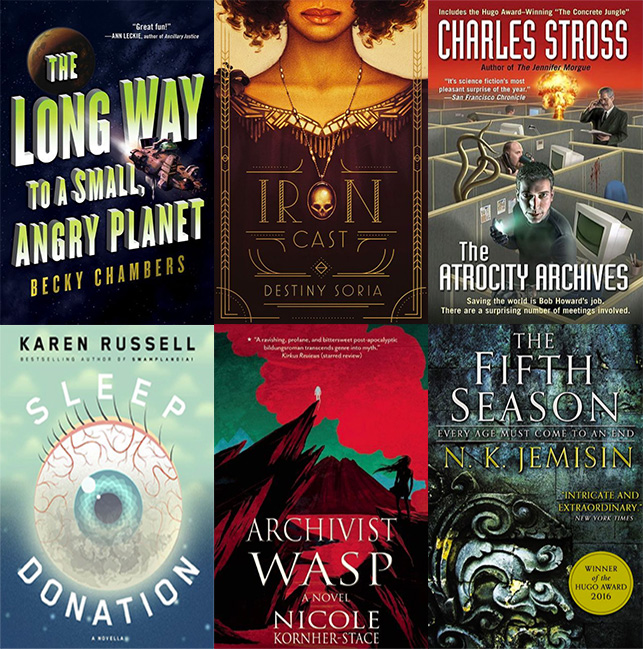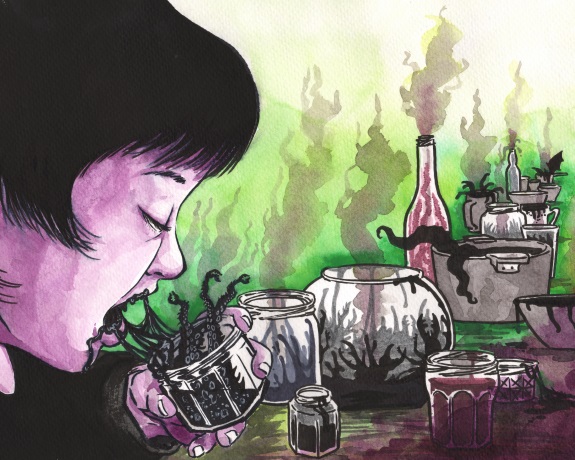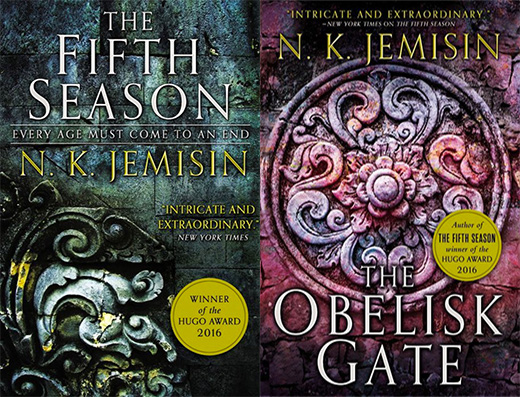Working on a book-focused online magazine like Tor.com makes us aware of a lot of fiction that we otherwise may never hear about and every year many of these new books rise out of our coverage calendars and to-do lists and find warmly furnished places in our heart.
Although sometimes it takes them an extra year or two!
Below are a few of the books that ensnared the Tor.com staff in 2016; that made us waltz right into each other’s increasingly unicorn-adorned offices and squibble with joy.
The Long Way to a Small, Angry Planet by Becky Chambers
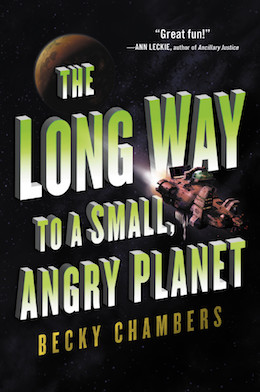 Hey, you know how 13 years ago you liked that TV show Firefly and then 6 years ago you thought that now would be a great time to revive it on Netflix and then a couple years ago you realized, wow, it’s been a long time I guess that ship has well and truly sailed? Pick up The Long Way to a Small, Angry Planet. It’s basically Firefly in book form, except most of the crew of the Wayfarer space junker actually really love each other! The plot does a great job of laying out a new ‘verse with familiar politics, while producing scene after scene of fun character interactions. The crew is stupendously diverse and Chambers uses that aspect to really bring modern day frustrations fully into this futuristic tale; proving over and over again that when our systems fail, when we’re brushed aside by powerful forces, staying true to a universal sense of decency and respect is what truly brings us what we need.
Hey, you know how 13 years ago you liked that TV show Firefly and then 6 years ago you thought that now would be a great time to revive it on Netflix and then a couple years ago you realized, wow, it’s been a long time I guess that ship has well and truly sailed? Pick up The Long Way to a Small, Angry Planet. It’s basically Firefly in book form, except most of the crew of the Wayfarer space junker actually really love each other! The plot does a great job of laying out a new ‘verse with familiar politics, while producing scene after scene of fun character interactions. The crew is stupendously diverse and Chambers uses that aspect to really bring modern day frustrations fully into this futuristic tale; proving over and over again that when our systems fail, when we’re brushed aside by powerful forces, staying true to a universal sense of decency and respect is what truly brings us what we need.
If you need an uplifting sci-fi story, this is it. —Chris
Among Others by Jo Walton
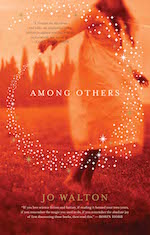 This year I finally read Jo Walton’s Among Others! It falls into my favorite subgenre, books about other books. The plot is wisp-thin, and is unique for a fantasy novel in that it deals with the aftermath of the battle that would have formed the climax of a more typical story. Morwenna and her twin, Morgana, have saved the world from their nasty and increasingly powerful witch of a mother. The battle led to Morgana’s death, and left Morwenna with a bad leg that keeps her in constant pain. Mori is sent off to her father, who promptly sends her off to boarding school. She’s shattered: her twin is dead (everyone thinks it was a bus accident that killed her), she can’t run or play sports, she has no interest in the girls at school, and they regard her as a freak because of her leg. The only ray of light in the situation is that her father turns out to be a huge nerd. He not only gives her free run of his giant SFF library, he also regularly sends five pound note down so she can buy more books, and between this, her visitations to the school library, and her weekly treks from school to the town library, the local geeks notice her and offer her community.
This year I finally read Jo Walton’s Among Others! It falls into my favorite subgenre, books about other books. The plot is wisp-thin, and is unique for a fantasy novel in that it deals with the aftermath of the battle that would have formed the climax of a more typical story. Morwenna and her twin, Morgana, have saved the world from their nasty and increasingly powerful witch of a mother. The battle led to Morgana’s death, and left Morwenna with a bad leg that keeps her in constant pain. Mori is sent off to her father, who promptly sends her off to boarding school. She’s shattered: her twin is dead (everyone thinks it was a bus accident that killed her), she can’t run or play sports, she has no interest in the girls at school, and they regard her as a freak because of her leg. The only ray of light in the situation is that her father turns out to be a huge nerd. He not only gives her free run of his giant SFF library, he also regularly sends five pound note down so she can buy more books, and between this, her visitations to the school library, and her weekly treks from school to the town library, the local geeks notice her and offer her community.
Walton doesn’t give too much time to this community, however, because she’s too busy taking us through Mori’s reading diary. The girl devours books, and we get to see how her reading interacts with her physical pain, her grief for her sister, and her constant fear that her mother, who is still alive, might turn back up. It’s a perfect bildungsroman, because we get to see Morwenna grow and change through her reading (the same way most of us did) while we also see just enough of her magic to be convinced we’re in a fantasy, and enough of her real-world pain to see that magic doesn’t help all that much.
If you love books, and especially if you love SFF, this book will feel like a warm-but-slightly-spiky hug.—Leah
“Hungry Daughters of Starving Mothers” by Alyssa Wong
Oddly, I’ve been reading way more short fiction this year than I usually do. Or maybe I should say luckily? Because in the process of this short fiction binge I’ve been on, I started reading Alyssa Wong’s work, and that is a lucky thing indeed. “Hungry Daughters of Starving Mothers” was the first I came across after hearing it had won the 2015 Nebula Award for Best Short Story, and it stuck with me for being exactly the sort of horror that I like–a slow burn that deals with power dynamics and history and love. It is wonderfully creepy, but Wong’s prose is really what grabs you; “evocative” is too little of a term to describe how she uses language. It’s probably better to say that there are many types of nourishment (both terrifying and benign) in this story, and words are one of them. But really, you should just go to her website and select any of the work she has online. I have an extra squishy soft spot for “You’ll Surely Drown Here If You Stay” in Uncanny Magazine because I secretly adore stories written in the second person, which are notoriously tough to do right.
Get out of here, read all the things!—Emily
The Atrocity Archives and The Jennifer Morgue by Charles Stross
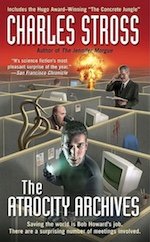 I’ve had Charles Stross’s Laundry books on my to-be-read pile for quite a few years, and as Tor.com will be publishing his next one in 2017, I figured it was time to push the series to the top of the list. I devoured The Atrocity Archives and I’m kicking myself for having left it so long. It’s everything I want in a book–great writing, a well thought-through magic system, characters who act consistently, and an accurate representation of the very British way of running a government department, complete with every layer of unnecessary bureaucratic bullshit that we have (unfortunately) come to expect. (I was a civil servant in my very early years, and I keep rewatching Yes Minister as a documentary).
I’ve had Charles Stross’s Laundry books on my to-be-read pile for quite a few years, and as Tor.com will be publishing his next one in 2017, I figured it was time to push the series to the top of the list. I devoured The Atrocity Archives and I’m kicking myself for having left it so long. It’s everything I want in a book–great writing, a well thought-through magic system, characters who act consistently, and an accurate representation of the very British way of running a government department, complete with every layer of unnecessary bureaucratic bullshit that we have (unfortunately) come to expect. (I was a civil servant in my very early years, and I keep rewatching Yes Minister as a documentary).
After reading it, the sequel—The Jennifer Morgue—worked its way up to the very top of my reading list, and I was not disappointed by that, either.—Lee
The Fifth Season and The Obelisk Gate by N.K. Jemisin
I know, I know. This is one of those picks you see in everyone’s Best Of list and it just feels so expected that you develop a resistance to it. You don’t doubt that Jemisin’s Broken Earth trilogy is great, but everyone is already singing its praises, and you want to find something different and wonderful and not as lauded. And that’s great! One should follow one’s instinct to seek The Great Things. But also, on the way to seeking the great things, read The Fifth Season. It’s a deeply emotional story in a rich fantasy world, containing deep veins of love, betrayal, and magic. And it moves. It is a rocket train barreling to the coast. It is a supernova devouring a planet. Almost every chapter ends with a cliffhanger and before you know it you’ve read the whole book and are downloading the next one and reviewing your notes on the lore of this fantasy world.
The Broken Earth trilogy is very satisfying. A literary meal that leaves you full and happy.—Chris
Archivist Wasp by Nicole Kornher-Stace
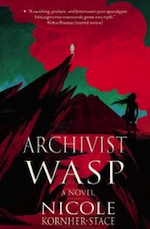 I’ve got absolutely no excuse for not having read Archivist Wasp the minute it came out; basically every one of my bookish friends who knows my taste insisted that I do so. Sometimes, though, it seems like books need you to wait until you’re ready for them—or you need them. And so in the middle of a difficult year, I read Wasp in a matter of days, because Wasp’s story is impossible to put down once you’ve picked it up. Every year, Wasp has to fight to keep her job as Archivist, the person who catches ghosts and uses them to learn about the past. But “fight” is an understatement: she has to kill the upstarts, young challengers who wish to take her position. In the prologue, Wasp breaks this tradition. The decision changes her life entirely: She runs from her small town and the cruel, watchful eye of her goddess’s priest. Reluctantly, she teams up with a strong ghost, a soldier who searches for the ghost of his lost love. They descend into the underworld on a frustrating, difficult quest that’s as much about Wasp understanding her world as it is about finding one solitary ghost.
I’ve got absolutely no excuse for not having read Archivist Wasp the minute it came out; basically every one of my bookish friends who knows my taste insisted that I do so. Sometimes, though, it seems like books need you to wait until you’re ready for them—or you need them. And so in the middle of a difficult year, I read Wasp in a matter of days, because Wasp’s story is impossible to put down once you’ve picked it up. Every year, Wasp has to fight to keep her job as Archivist, the person who catches ghosts and uses them to learn about the past. But “fight” is an understatement: she has to kill the upstarts, young challengers who wish to take her position. In the prologue, Wasp breaks this tradition. The decision changes her life entirely: She runs from her small town and the cruel, watchful eye of her goddess’s priest. Reluctantly, she teams up with a strong ghost, a soldier who searches for the ghost of his lost love. They descend into the underworld on a frustrating, difficult quest that’s as much about Wasp understanding her world as it is about finding one solitary ghost.
Wasp’s life is solitary and hard. Kornher-Stace writes about pain—crushing, physical pain—with terrible, vivid, bright language. No one ever gets off the hook easily in this story: the world is hard, the journey is hard, the main characters are hurting and prickly, an unlikely pair who need rather than want each other’s help. Archivist Wasp is a story about the difficult truth of cutting through the lies that structure a world, the falsehoods and stories and twisted mythologies that keep people in their place. It’s about doing the work—and figuring out which work really needs doing. —Molly
Sleep Donation by Karen Russell
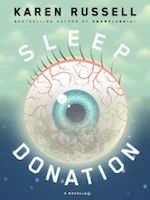 At first I felt self-conscious putting forward a novella instead of a book, but all of the books I liked best this year (The Shining Girls, Crosstalk, HEX) came with caveats. So instead I thought about my absolute favorite reading experience, which ironically was the first piece of fiction I finished reading back in January: Sleep Donation, Karen Russell’s novella about a nationwide insomnia crisis that turns Americans into shadows of their former selves (and in many cases claims lives). I’m a fan of the topic—I’m researching fatal insomnia for a play—but what I was truly drawn to was not the bleak speculative future Russell envisions, but how humans respond to the new status quo. Our narrator, Trish Edgewater, would fit in among Gillian Flynn’s rogues gallery of prickly female protagonists: Working for Slumber Corps, an agency that handles “sleep donations” the way we did blood in a pre-insomnia world, Trish entices healthy sleepers to give over some of their soothing slumber by sharing the tearjerking story of her sister, Dori. Before Slumber Corps was as ubiquitous as bloodmobiles, Dori’s insomnia drove her into nearly three weeks of sleeplessness, at which point her body gave in and she “died awake … [l]ocked flightlessly inside her skull.”
At first I felt self-conscious putting forward a novella instead of a book, but all of the books I liked best this year (The Shining Girls, Crosstalk, HEX) came with caveats. So instead I thought about my absolute favorite reading experience, which ironically was the first piece of fiction I finished reading back in January: Sleep Donation, Karen Russell’s novella about a nationwide insomnia crisis that turns Americans into shadows of their former selves (and in many cases claims lives). I’m a fan of the topic—I’m researching fatal insomnia for a play—but what I was truly drawn to was not the bleak speculative future Russell envisions, but how humans respond to the new status quo. Our narrator, Trish Edgewater, would fit in among Gillian Flynn’s rogues gallery of prickly female protagonists: Working for Slumber Corps, an agency that handles “sleep donations” the way we did blood in a pre-insomnia world, Trish entices healthy sleepers to give over some of their soothing slumber by sharing the tearjerking story of her sister, Dori. Before Slumber Corps was as ubiquitous as bloodmobiles, Dori’s insomnia drove her into nearly three weeks of sleeplessness, at which point her body gave in and she “died awake … [l]ocked flightlessly inside her skull.”
But when an anonymous sleep donor infects the samples with a nightmare, tainted slumber becomes the real disease—shared on the black market, scaring people away from life-saving donations. Only babies, with their “pure, bracing sleep, with zero adult terror corrupting it,” can combat nightmare-laced transfusions—and one infant, Baby A, proves a particularly pure specimen. To convince Baby A’s parents Mr. and Mrs. Harkonnen to allow Slumber Corps to return again and again to Baby A’s sleep, Trish must lay it on thick, dishonoring Dori’s memory by using it as a commodity, even as she grows to doubt the selflessness of Slumber Corps’ mission.
This is what grips me about this too-short tale: Russell doesn’t go the easy dystopian route of how an epidemic like this would make society buckle; instead, she uses it as a new lens to examine the uneven trade of transfusions. Tapping into babies’ sleep; resurrecting Dori to seal the deal; sharing a cot in the SlumberCorps truck not for sleep but for a different horizontal comfort; choosing to share or withhold valuable information—these are all transfusions, transactions that carry complicated power dynamics. Also, her prose is so gorgeous it’s not even fair. —Natalie
The Scorpio Races by Maggie Stiefvater
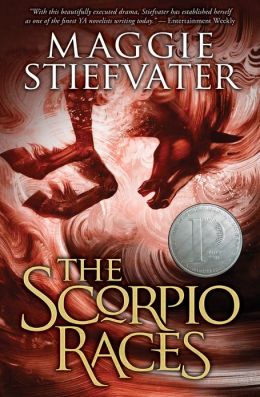 One of my favorite things about holidays and long weekends is the opportunity to just sink completely into a book and read it cover to cover, without silly distractions like “work” and “needing to get enough sleep” and “being an adult with responsibilities.” Over the Thanksgiving break, I finally got the chance to dive into a novel that I’d been saving for the right moment: Maggie Stiefvater’s The Scorpio Races. It’s been out for over five years, and in that time I’ve probably had over a dozen different people recommend it to me; I also loved Stiefvater’s recently completed Raven Cycle (which Lee Mandelo has discussed so wonderfully here), so the odds that I would enjoy this novel were admittedly rather high, going in.
One of my favorite things about holidays and long weekends is the opportunity to just sink completely into a book and read it cover to cover, without silly distractions like “work” and “needing to get enough sleep” and “being an adult with responsibilities.” Over the Thanksgiving break, I finally got the chance to dive into a novel that I’d been saving for the right moment: Maggie Stiefvater’s The Scorpio Races. It’s been out for over five years, and in that time I’ve probably had over a dozen different people recommend it to me; I also loved Stiefvater’s recently completed Raven Cycle (which Lee Mandelo has discussed so wonderfully here), so the odds that I would enjoy this novel were admittedly rather high, going in.
Still, there’s something deeply pleasurable about finally getting lost in a world you’ve been meaning to visit for so long, especially when that world is as starkly beautiful and atmospheric as the island of Thisby. I won’t get into the specifics of the plot, since Stiefvater’s carefully-constructed character development and the narrative are inextricable from one another, and to summarize the details would be a disservice to the intricately interwoven perspectives of her two protagonists. Suffice it to say that every November, tourists flock to Thisby—a small, rocky, isolated island that wouldn’t be out of place off the coast of Ireland or Scotland—to see the Scorpio Races, in which the capaill uisce, wild and deadly water horses, are trained and raced (but never fully tamed) by their human riders.
Based in Celtic mythology, The Scorpio Races is a story of wants, needs, sacrifice, and freedom—figuring out exactly what freedom means and what you’re willing to give up to achieve it. It’s a moody and thrilling and wistful read, perfect for a late autumn journey to a world that feels both magical and strangely real.—Bridget
Death’s End by Cixin Liu, as translated by Ken Liu
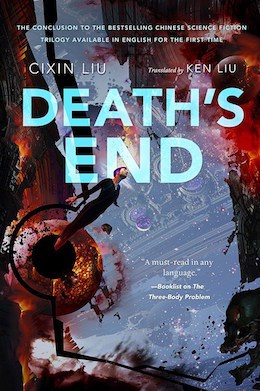 Cixin Liu’s Three-Body Problem trilogy offers a very exact viewpoint on the universe and the life within it. It’s not a viewpoint that I agree with on a personal level—there’s a lot of resigned acceptance of ideas that stem from authority and that triggers my Spock eyebrow like whoa—but watching that perspective unfold through the entire series has been illuminating and thrilling. Cixin Liu is a tremendous engine for ideas and each book in the trilogy left me wondering just where the author could possibly go next. The series meets and exceeds that challenge again and again, and there are scenes and ideas from this series that will stick in my mind forever. (There’s a particular thing that the series does with the mechanics of light speed that I have to constantly remind myself is fictional, not real! That’s how imaginative these books are; they can override fact.)
Cixin Liu’s Three-Body Problem trilogy offers a very exact viewpoint on the universe and the life within it. It’s not a viewpoint that I agree with on a personal level—there’s a lot of resigned acceptance of ideas that stem from authority and that triggers my Spock eyebrow like whoa—but watching that perspective unfold through the entire series has been illuminating and thrilling. Cixin Liu is a tremendous engine for ideas and each book in the trilogy left me wondering just where the author could possibly go next. The series meets and exceeds that challenge again and again, and there are scenes and ideas from this series that will stick in my mind forever. (There’s a particular thing that the series does with the mechanics of light speed that I have to constantly remind myself is fictional, not real! That’s how imaginative these books are; they can override fact.)
It’s also a very inspiring series to read if you want to write science fiction. There are hundreds of ideas and scenarios in Cixin Liu’s books that could be fleshed into beautiful, stirring stories on their own, and it’s one of the few sci-fi sagas that encourages its readers to rewrite its ending. My brain is different for having read Death’s End.—Chris
Iron Cast by Destiny Soria
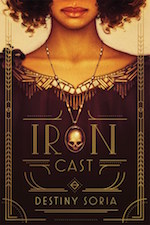 If Archivist Wasp is the book everyone else told me to read, Iron Cast is the one I just won’t stop shoving at people. Destiny Soria’s debut novel is set in a magical version of 1919, where “hemopaths” are hated and feared for the magic in their blood. Best friends Ada and Corinne spend their nights at the Cast Iron, a club that’s both home and employment for the two of them. They perform for club patrons using Corinne’s word magic and Ada’s musical gifts to create transporting illusions, but their other work is somewhat less savory: using their magic to con wealthy Bostonians. The threat of Haversham Asylum hangs over everything: hemopaths who go in rarely come out. But more mundane threats also interrupt Corinne and Ada’s lives: the owner of the Cast Iron goes missing, ongoing rivalries come to the fore, and the club’s continued existence is anything but guaranteed.
If Archivist Wasp is the book everyone else told me to read, Iron Cast is the one I just won’t stop shoving at people. Destiny Soria’s debut novel is set in a magical version of 1919, where “hemopaths” are hated and feared for the magic in their blood. Best friends Ada and Corinne spend their nights at the Cast Iron, a club that’s both home and employment for the two of them. They perform for club patrons using Corinne’s word magic and Ada’s musical gifts to create transporting illusions, but their other work is somewhat less savory: using their magic to con wealthy Bostonians. The threat of Haversham Asylum hangs over everything: hemopaths who go in rarely come out. But more mundane threats also interrupt Corinne and Ada’s lives: the owner of the Cast Iron goes missing, ongoing rivalries come to the fore, and the club’s continued existence is anything but guaranteed.
As compelling as Soria’s fantasy-mystery-alternate history novel is, the action isn’t the real draw here. Ada and Corinne are. Ada is the daughter of immigrants, Corinne a child of wealth and privilege, and Soria is sharply aware of the different ways the two young women move through the world. It’s the rare YA novel that depicts such a perfect balance of different kinds of relationships: Ada and Corinne have love interests, but they also have families (both by blood and by choice)—and each other. The relationship that powers Soria’s narrative is their close, vital friendship. Vivid to the point of being downright cinematic (I so want to see this as a movie!), Iron Cast is one of the best debuts I’ve read in ages. (And seriously, just look at that cover. It’s gorgeous.)—Molly










